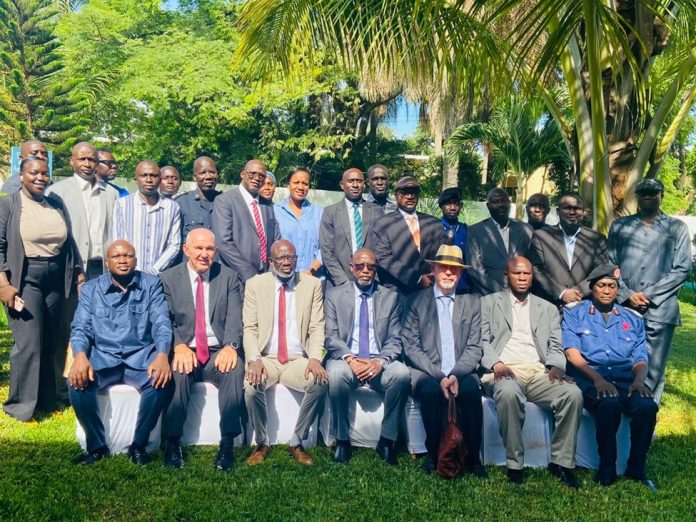By Mustapha Jallow
The Interior Ministry, in partnership with Geneva Central for Security Sector Governance (DCAF), the European Union, and the office of the National Security Adviser on Wednesday validated an Internal Security Policy (ISP) document meant to help address the security challenges facing the country.
Funded by the EU, the policy further underscores the need to uphold human rights, promote good governance, and foster community engagement in security initiatives.
Held at a local hotel in Kololi, the one-day event was attended by senior government, security officials, DCAF, EU leaders and other senior officers.
“The ISP outlines strategies to improve public trust and confidence in our security institutions,” remarked Abdoulie Sanyang, minister for interior, while delivering a keynote speech.
He added the ISP ensures security agencies effectively address emerging threats such as cyber-crimes, drug trafficking and terrorism.
Minister Sanyang went on to explain how the policy is designed to align with their national development goals and international human rights standards.
“It underscores our commitment to safeguarding the rights and dignity of every Gambian, ensuring that security measures are not only effective but also just and humane,” he says.
Cornelio Pampaloni, the ambassador for the EU, expressed his gratitude for how the European Union always placed a high priority on supporting the SSR agenda of the government, particularly in strengthening their internal security capabilities.
“I am confident that this policy will serve as a valuable tool in safeguarding our communities and upholding the rule of law and respect for human rights,” he confidently stated.
According to Ambassador Pampaloni, the EU stands ready to continue supporting the Gambia in implementing a sustainable SSR and further enhancing the collective security efforts.
“As we move forward, let us remember that security is a shared responsibility that requires a coordinated and collaborative approach. By working together, we can create a safer and more secure environment for all our citizens,” he added.
Since establishing a permanent office in The Gambia in 2018, Ken Isaac, DCAF chief in Banjul said: “We have dedicated ourselves to ensuring that international support is aligned with local needs. Our approach involves close collaboration with security institutions.”
“We extend our profound appreciation to the EU for their investment in the Gambia through the project titled “Gambian SSR Process for Improved Security, Migration, and Border Management,” and for funding the development of this ISP,” he concluded.
Abubakarr Suleiman Jeng, the national security adviser to the President said the policy outlined strategic objectives, operational framework, and actionable means that will guide efforts to address the evolving security challenges facing the nation.
“By building trust, inclusivity, and transparency, we can create a safer and more resilient society, where every citizen feels protected and valued,” he says.





















